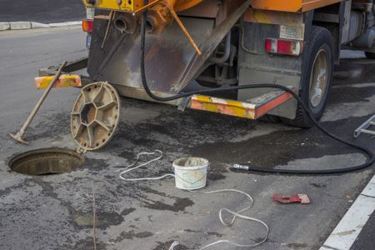Specialized Nozzles Unlock The Full Potential Of Recycled Water Trucks
By Del Williams

Today, many contractors and municipal operators are investing in sewer cleaner trucks equipped with eco-friendly water recycling systems that facilitate cleaning more line in less time. However, even high-quality jetting nozzles can become clogged when recycled water is not sufficiently filtered. This results in excessive downtime as operators must repeatedly halt production to clean the nozzles, negating some of the vehicle’s productivity benefits.
An increasingly adopted solution is to use nozzles designed to accommodate the fine particulates commonly found in recycled water. These specialized nozzles allow the water to flow efficiently through the system without clogging, enabling operators — such as municipalities and contractors — to clean as much as 12,000 feet of line per day, a significant improvement over the 2,500 feet typically achieved with standard nozzles.
“When the recycling system doesn’t adequately filter the water, particulates can enter the nozzle’s channels,” says Dan Story, Operations Manager at KEG Technologies. “If the orifice is too small or poorly designed, the debris builds up and causes blockages, reducing flow and productivity.”
Signs of clogging can include pressure spikes and reduced RPMs. In the short term, nozzles can be disassembled, cleaned, and reassembled — a process that takes 15–30 minutes and results in lost work time. In the long term, many operators are turning to purpose-built nozzles that resist clogging, combined with routine system maintenance.
These non-clogging nozzles typically feature smoother internal channels and larger or specially curved flow paths that accommodate small debris. Some are based on advanced fluid dynamics and include options like vibrating rotational nozzles for cleaning hardened deposits, or chain cutters designed for removing lime, concrete, and root growth from sewer pipes ranging from 6–48” in diameter.
Newer designs also eliminate internal bushings or shafts that could seize when obstructed by particulates. Instead, they provide more reliable, uninterrupted performance, allowing for longer jetting sessions without downtime or the need to refill with potable water.
With these innovations, operators can jet continuously using recycled or manhole water, maximizing efficiency while conserving fresh water and reducing equipment wear and fuel use.
As more industries explore the benefits of recycled water truck systems, many are discovering that investing in the right nozzle technology — despite higher initial costs — pays off in reduced labor, water usage, and operating costs.
“When you can potentially triple or quadruple the amount of pipe you clean daily, it’s an easy decision,” says Story. “The return on investment is fast, and the operational benefits are clear.”
Del Williams is a technical writer based in Torrance, California.
